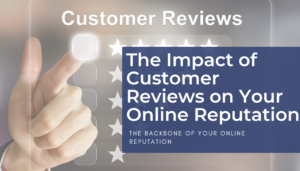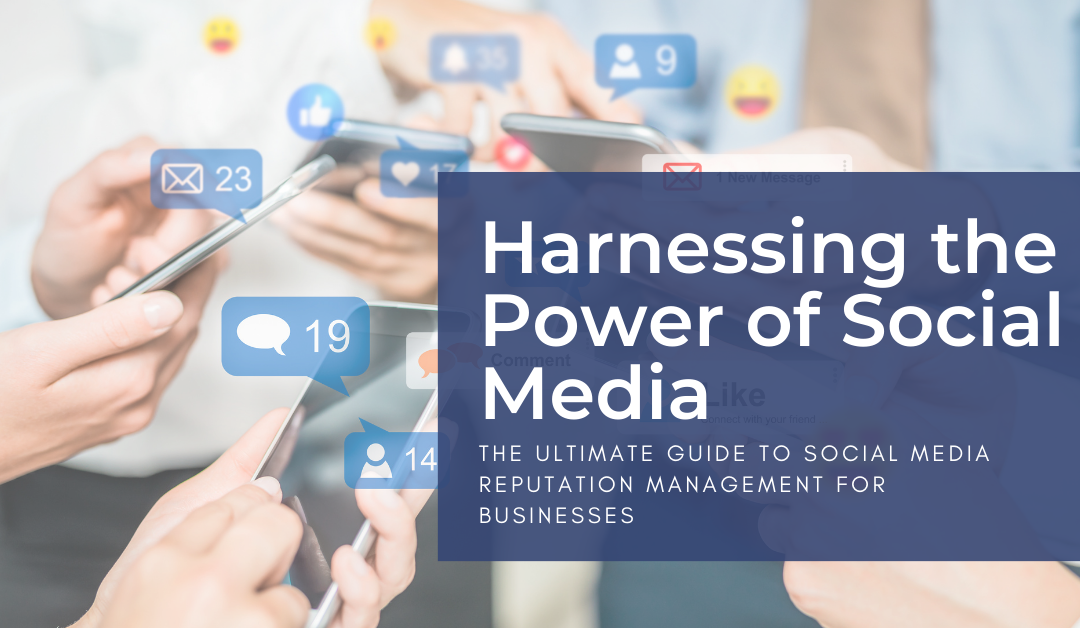In today’s digital age, where information travels at the speed of a click, a brand’s reputation can be made or broken within seconds. Social media has emerged as a dynamic platform that has revolutionized the way businesses connect with their audience. It’s not just a tool for sharing updates or engaging with customers; it plays a pivotal role in reputation management. In this comprehensive guide, we’ll explore the ins and outs of social media reputation management and reveal the strategies that can help your business thrive.
The Power of Social Media: Shaping Brand Perceptions
Instant Amplification:
Social media platforms have transformed the way information spreads. With just a single post, your message can reach millions of users in a matter of minutes. This unparalleled speed and reach make it crucial for businesses to actively monitor and manage their brand’s online presence. Whether it’s a glowing customer testimonial or a negative review, social media has the power to amplify and shape the perception of your brand like never before.
Positive mentions and interactions on social media can generate a ripple effect, inspiring others to engage with your brand and potentially become loyal customers. Conversely, negative posts can quickly go viral, causing reputational damage if left unaddressed. By proactively managing your social media presence, you can leverage the instant amplification of social platforms to your advantage.
Transparent Communication:
One of the key benefits of social media is its ability to facilitate direct and transparent communication between businesses and their audience. Unlike traditional forms of marketing, social media allows for real-time interactions, enabling brands to respond promptly to customer inquiries, concerns, or feedback. This transparent communication builds trust and fosters a positive perception of your brand.
When businesses actively engage with their audience on social media, it demonstrates a commitment to customer satisfaction and shows that the brand values the opinions and experiences of its customers. By promptly addressing issues, resolving problems, and openly communicating with your audience, you can proactively manage your brand’s reputation and strengthen relationships with your customers.
Viral Nature of Social Media:
Social media platforms thrive on content that resonates with users. Memes, viral videos, and impactful stories have the potential to spread like wildfire across social media channels. When your brand creates compelling and shareable content, it increases the chances of your message going viral, thus amplifying your brand’s reach and shaping perceptions on a massive scale.
The viral nature of social media can be harnessed to reinforce positive brand sentiment. By crafting captivating and memorable content that aligns with your brand’s values and resonates with your target audience, you can encourage users to engage with and share your content, further expanding your brand’s influence and reputation.
Influence of User-Generated Content:
Social media has empowered consumers to become active participants in shaping brand perceptions through user-generated content (UGC). UGC refers to any content created and shared by users about a brand or its products. This includes reviews, testimonials, images, videos, and more.
UGC holds immense power as it is perceived as authentic and trustworthy. Positive UGC not only bolsters your brand’s reputation but also serves as social proof, influencing potential customers’ purchasing decisions. By encouraging and showcasing UGC, you can harness the collective power of your satisfied customers to shape a positive brand image and enhance your reputation.
Customer Feedback and Sentiment Analysis:
Social media provides businesses with an abundance of real-time feedback and insights into customer sentiment. Through sentiment analysis, brands can gain valuable insights into how customers perceive their products, services, and overall brand experience.
By analyzing customer feedback, both positive and negative, businesses can identify areas for improvement, address issues promptly, and take proactive steps to enhance customer satisfaction. Monitoring sentiment trends and sentiment analysis tools enable brands to gauge the effectiveness of their reputation management strategies and make data-driven decisions to shape positive brand perceptions.
By understanding and harnessing the power of social media, businesses can proactively manage their brand’s reputation, shape positive perceptions, and foster meaningful connections with their target audience. The strategies and insights gained through social media reputation management can be leveraged to drive business growth, enhance customer loyalty, and stay ahead in today’s competitive digital landscape.
Understanding Social Media Reputation Management
What is Social Media Reputation Management?
Social media reputation management is the practice of monitoring, influencing, and managing your brand’s online reputation across various social media platforms. It involves actively tracking and responding to brand mentions, customer feedback, reviews, and discussions to shape public perception and maintain a positive brand image.
Effective social media reputation management goes beyond simply having a presence on social media. It requires a strategic approach to proactively monitor, engage, and address any potential reputation-related issues that may arise. By actively managing your brand’s reputation on social media, you can ensure that the narrative surrounding your brand is accurate, positive, and aligns with your desired brand image.
Why is Social Media Reputation Management Important?
In today’s interconnected digital landscape, a strong online reputation is crucial for businesses of all sizes. Here’s why social media reputation management is essential:
Building Trust and Credibility
Consumers rely heavily on online reviews, recommendations, and social media conversations when making purchasing decisions. By actively managing your brand’s reputation on social media, you can build trust and credibility among your target audience, which can lead to increased customer loyalty and sales.
Influencing Brand Perception
Social media provides a platform for businesses to actively shape how they are perceived by their audience. By consistently delivering valuable content, engaging with customers, and addressing their concerns, you can influence the narrative surrounding your brand, reinforce positive perceptions, and mitigate any negative sentiment.
Managing Crises and Mitigating Damage
Social media can become a breeding ground for crises that can potentially harm your brand’s reputation. Effective reputation management allows you to detect and address issues promptly, minimizing the impact of negative incidents. By having a crisis management plan in place and actively monitoring social media channels, you can respond swiftly, transparently, and effectively to protect your brand’s reputation.
Attracting and Retaining Customers
A positive online reputation can be a powerful differentiator in a competitive market. When consumers see that your brand has a strong presence on social media and consistently receives positive feedback, they are more likely to choose your products or services over those of your competitors. Additionally, satisfied customers may become brand advocates, referring others to your business and helping you expand your customer base.
Staying Ahead of the Competition
Social media reputation management allows you to keep a pulse on your industry and competitors. By monitoring industry conversations, tracking competitor activities, and engaging with relevant influencers, you can identify trends, opportunities, and potential threats. This knowledge gives you a competitive edge and helps you adapt your strategies to stay ahead.
Overall, social media reputation management is vital for businesses to establish a positive brand image, build trust with their audience, manage crises effectively, attract and retain customers, and stay competitive in the digital landscape.
By implementing proactive strategies and closely monitoring social media channels, businesses can leverage the power of social media to their advantage and cultivate a strong and resilient online reputation.
Key Strategies for Effective Social Media Reputation Management
Proactive Monitoring and Listening:
Effective social media reputation management begins with proactive monitoring and listening. Set up robust monitoring tools and alerts to stay informed about brand mentions, customer feedback, reviews, and industry conversations. By actively listening to your audience, you can identify potential issues or opportunities, gain valuable insights, and respond promptly.
Regularly monitor social media platforms, online review sites, and relevant forums to ensure you are aware of what people are saying about your brand. This allows you to address any negative sentiment or customer concerns in a timely manner, preventing issues from escalating and damaging your reputation.
Engaging with Your Audience:
Engagement is key to managing your brand’s reputation on social media. Actively respond to comments, messages, and reviews from your audience. Whether it’s a positive feedback or a customer complaint, show that you value their opinions and are committed to providing excellent customer service.
When responding to negative feedback, take a calm, empathetic, and solution-oriented approach. Address the issue publicly while offering to take the conversation offline to resolve it privately. By demonstrating your willingness to listen and resolve problems, you can turn negative experiences into positive ones and showcase your dedication to customer satisfaction.
Influencer Partnerships:
Influencers can play a significant role in shaping your brand’s reputation on social media. Collaborate with influencers who align with your brand values and have a strong following in your target market. Their endorsement and positive experiences with your brand can have a substantial impact on your audience’s perception.
Work with influencers to create engaging content, such as product reviews, sponsored posts, or collaborative campaigns. These partnerships can help amplify your brand’s reach, increase positive sentiment, and attract new customers. However, ensure that influencer collaborations are authentic and transparent to maintain the trust of your audience.
Crisis Management:
Having a well-defined crisis management plan is crucial for effectively managing your brand’s reputation on social media. Crises can arise unexpectedly, and how you handle them can significantly impact your brand’s reputation.
Develop a comprehensive crisis management plan that outlines roles, responsibilities, and communication protocols. Anticipate potential crisis scenarios and devise strategies to address them promptly. During a crisis, respond quickly, transparently, and empathetically. Provide regular updates, address concerns, and demonstrate your commitment to resolving the issue. By handling crises effectively, you can mitigate reputational damage and maintain trust with your audience.
Content Strategy:
Crafting compelling, valuable, and shareable content is a powerful strategy for social media reputation management. Share informative blog posts, engaging videos, captivating images, and interactive content that resonates with your target audience. Delivering high-quality content establishes your brand as an industry expert and generates positive conversations around your brand.
Encourage user-generated content (UGC) by running contests, featuring customer stories, or showcasing customer testimonials. UGC serves as social proof and can enhance your brand’s reputation. Share UGC on your social media channels, giving credit to the creators, and engaging with your audience around it.
Consistently posting and sharing valuable content helps shape a positive brand image, encourages audience engagement, and fosters a loyal community around your brand.
By implementing these key strategies for effective social media reputation management, businesses can actively shape their brand narrative, build trust with their audience, resolve issues promptly, and foster positive brand sentiment. These strategies, when executed thoughtfully and consistently, contribute to a resilient and positive online reputation.
Leveraging Different Social Media Platforms for Reputation Management
Facebook:
With over 2.8 billion monthly active users, Facebook is a powerful platform for reputation management. Create a professional Facebook Page for your business and regularly update it with engaging content. Respond to comments, messages, and reviews promptly, showcasing your dedication to customer satisfaction.
Utilize Facebook’s monitoring tools, such as Page Insights, to gain valuable insights into audience engagement, reach, and demographics. Leverage Facebook Groups related to your industry or target audience to actively participate in discussions and establish your brand as a thought leader. Additionally, running targeted ads on Facebook can help promote positive content and reach a wider audience.
Twitter:
Twitter’s real-time nature makes it an effective platform for reputation management. Monitor brand mentions, hashtags, and industry conversations using tools like TweetDeck or Hootsuite. Respond to customer inquiries, feedback, and complaints promptly, demonstrating your commitment to customer service.
Leverage Twitter’s retweet and like features to amplify positive mentions and engage with influencers in your industry. Participate in relevant Twitter chats or host your own to connect with your audience and showcase your expertise. By proactively managing your brand’s presence on Twitter, you can shape brand perceptions and stay ahead of industry trends.
LinkedIn:
LinkedIn is a powerful platform for building professional connections and managing your brand’s reputation among industry professionals. Optimize your LinkedIn profile with compelling content, including thought leadership articles, industry insights, and company updates.
Engage with your audience by participating in relevant LinkedIn Groups, sharing valuable content, and commenting on posts from industry leaders. Encourage your employees to engage with your company’s LinkedIn page, as their individual profiles can also contribute to your brand’s reputation. LinkedIn provides an opportunity to position your brand as a trusted industry expert and foster meaningful relationships with other professionals.
Instagram:
Instagram’s visual nature makes it ideal for shaping a positive brand image and engaging with your audience on an emotional level. Create an appealing Instagram profile that reflects your brand’s values and aesthetic.
Share visually stunning images and videos that showcase your products, behind-the-scenes glimpses, or user-generated content. Leverage Instagram Stories and interactive features like polls and questions to actively engage with your audience. Monitor and respond to comments and direct messages to demonstrate your commitment to customer satisfaction.
Collaborate with influencers or brand advocates on Instagram to amplify your brand’s reach and reputation. User-generated content plays a crucial role on Instagram. Encourage your audience to share their experiences and tag your brand in their posts. Engaging with your audience authentically and consistently on Instagram can help shape a positive brand perception and build a loyal community.
Each social media platform offers unique opportunities for managing your brand’s reputation. Tailor your strategies to fit the strengths and characteristics of each platform. This ensures that your messaging and engagement align with your target audience’s preferences.
Remember to monitor and analyze the performance of your social media efforts using platform-specific analytics tools or third-party tools. This data will help you refine your reputation management strategies, identify successful tactics, and make data-driven decisions to continuously improve your brand’s online reputation.
FAQs About Social Media Reputation Management
Q1. How long does it take to build a positive online reputation?
A positive online reputation is an ongoing process and can take time. Consistently implementing reputation management strategies, engaging with your audience, and delivering exceptional customer experiences will gradually shape a positive perception.
Q2. What if my business receives negative reviews on social media?
Negative reviews are inevitable, but they provide an opportunity for growth. Address negative feedback promptly, empathetically, and publicly when appropriate. Showcasing your commitment to resolving issues can turn negative experiences into positive ones.
Engage with Darksky Digital for Social Media and Reputation Management
At Darksky Digital, we understand the critical role social media reputation management plays in shaping your brand’s success. Our team of experts specializes in data-driven strategies that elevate your brand’s online presence, manage your reputation, and drive meaningful engagement with your audience. Contact us today to embark on a journey toward building a resilient and positive brand reputation.
Final Thoughts
In the digital era, businesses cannot afford to overlook the influence of social media on their reputation. Implementing robust social media reputation management strategies ensures that you have control over your brand narrative, foster customer loyalty, and build a positive online presence. By leveraging the power of social media platforms and engaging with your audience, you can shape a brand reputation that stands the test of time.
Remember, your brand’s reputation is your most valuable asset—nurture it, protect it, and watch your business thrive!
Connect with Darksky Digital today to unleash the full potential of your brand’s social media reputation management. Let our experts guide you toward building a resilient online presence and cultivating a positive brand image. Contact us at 021 830 5271 or get a quote here.
Read more from our blog here:
- Understanding the Basics of Pay-Per-Click Advertising: A Beginner’s Guide

- 5 Types of Content Every Marketer Should Know About

- The Impact of Customer Reviews on Your Online Reputation

- Measuring the ROI of Your Social Media Marketing Campaign: Unraveling the Secrets to Digital Success

- Content Marketing vs. Traditional Advertising: Which is More Effective?

- Title: The Future of SEO: Unlocking the Secrets to Digital Success


